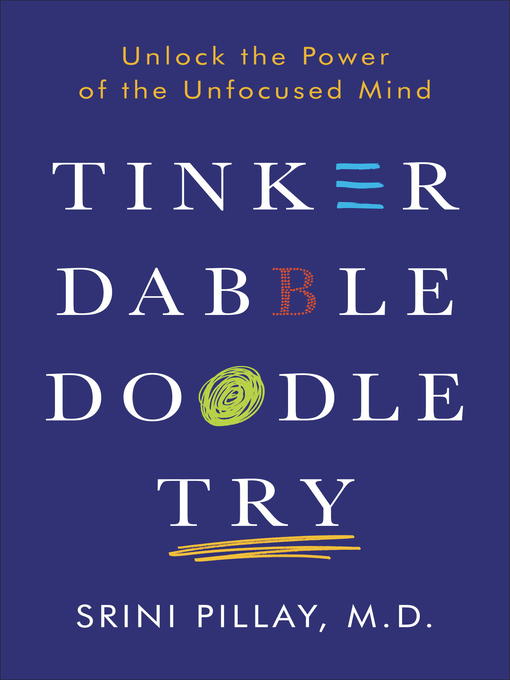
Tinker Dabble Doodle Try
Unlock the Power of the Unfocused Mind
کتاب های مرتبط
- اطلاعات
- نقد و بررسی
- دیدگاه کاربران
نقد و بررسی

July 31, 2017
Drawing on brain research, anecdotes from his psychological practice, and examples from sports, arts, and business, neuroscientist Pillay challenges traditional notions of productivity, arguing that there are benefits to unfocused thinking. According to Pillay, free time, when engaged in consciously, is as important as concentrating on set tasks. Moreover, it’s essential for certain types of tasks because it allows for internal processing and problem-solving and fulfills the mind’s need for opportunities to wander. In the audio edition, Pillay’s narration clearly indicates his enthusiasm for the subject; each time he reveals another use and reason for unfocused thinking, it feels like a fresh discovery. His crisp enunciation and deep voice with a slight English lilt make for a delightful listen. A Ballantine hardcover.

March 15, 2017
A combination of self-help and theoretical science that suggests learning to -unfocus- may be the key to living a more productive life.Harvard psychiatrist and brain imaging researcher Pillay (Life Unlocked: 7 Revolutionary Lessons to Overcome Fear, 2010) makes the case that the alternation of periods of focus and openness makes for increased learning and satisfaction. Letting go of precise goals allows one to -tinker- with one's experience, whether romantic or work-related, in hopes of fixing problems, while dabbling in areas in which one has no expertise prepares one for new possibilities, and doodling opens the door to the unconscious. While the author throws out so many suggestions that any reader will be bound to find more than a few useful ones, Pillay's affection for acronyms often makes the book difficult to read, and his use of language, with words like -tinkeringly,- can be off-putting. Although he tends to refer more frequently than necessary to celebrities like Jeff Bezos and Ryan Seacrest (whose life -sounds enigmatically unachievable and inconceivable-), Pillay cites an intriguing range of brain studies to support his argument, and his case studies of individuals with whom he has worked provide useful insights. The book might be most usefully read in fragments, since the cumulative effect of words of advice such as, -Be more playful and self-forgiving as you start to supertask- and -When lost, turn to your inner compass and ask, 'Who am I?' - can bog down skeptical readers. The author takes his place in the spectrum of advocates of the power of positive thinking with his contention that -every person is responsible for his or her own greatness.- While it may be unfair to complain that a book on the benefits of -unfocusing- suffers from a lack of focus, Pillay's constant jumping from one suggestion to another, many of which seem off-topic, makes the book less useful than it could be.
COPYRIGHT(2017) Kirkus Reviews, ALL RIGHTS RESERVED.

March 1, 2017
In his latest book on harnessing the power of the human mind, Pillay (psychiatry, Harvard Univ. Medical Sch.; Life Unlocked) posits that the key to success in all aspects of life is not focus, but "unfocus." This state of being, according to Pillay, encourages epiphanies, supermultitasking, and creating connections between seemingly unrelated concepts in the macro and the micro of day-to-day life. With both anecdotal and empirical evidence to support his thesis, Pillay uses his vast knowledge to point to examples of famous thinkers and entrepreneurs who have successfully channeled their unfocus to do great things while similarly providing summaries of various studies, thus effectively satisfying his theory on the benefits of unfocus. Each chapter's end features a helpful chart to describe behavior in a focused vs. an unfocused life, allowing readers to make concrete changes to their own behaviors. VERDICT Pillay's effortless writing style, combined with an excellent balance of popular psychology and self-help, makes this a helpful read for those who enjoy a light dive into psychology with practical applications.--Abby Hargreaves, Alexandria P.L., VA
Copyright 2017 Library Journal, LLC Used with permission.

























دیدگاه کاربران